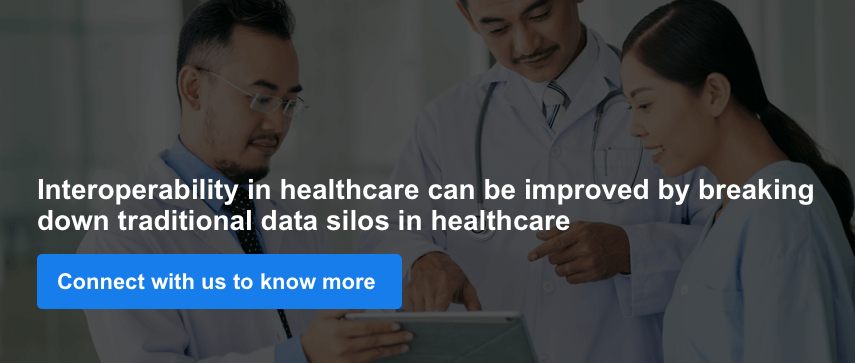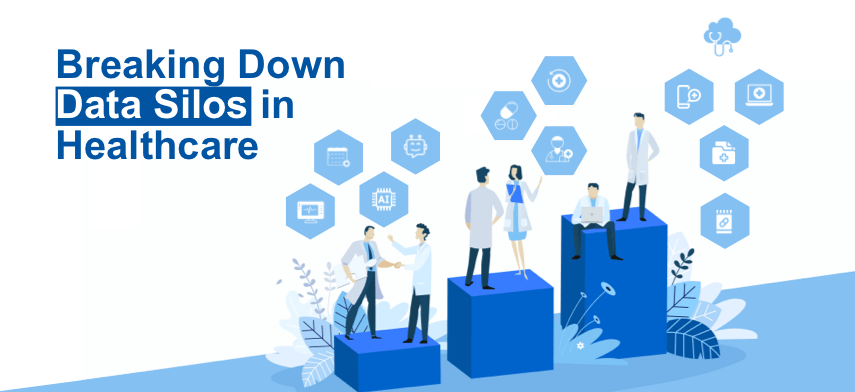The organizational structures are evolving with the integration of larger teams with the distributed workforce from having no ecosystem to catering to a diverse ecosystem. This evolution has been a great contributor to the functional silos in healthcare and inculcated discipline in organizations, but it has also led to the delivery of various multifaceted challenges that are affecting healthcare delivery services. As the market continues to demand faster, more affordable, and better care delivery, healthcare organizational structures are rethinking the significant drivers to improve the care delivery paradigm.
With all innovations in healthcare, incomplete patient information is still common trouble at the point of care. Frequently, there are multiple records and patient information lists that aren’t shared with the providers. For understanding better, patient health data management is still siloed largely even with information available through electronic health records. With health data management and exchange becoming so fluid, there is a broader use for EHRs. The Health Information Technology for Economic and Clinical Health (HITECH) needed to implement systems for the use of EHRs and there was no standardized requirement for EHRs to ensure that the data can be shared amongst various EHRs before it was widely adopted.
The healthcare teams aren’t alone in becoming overwhelmed with the silos in healthcare organizations. But it is important to understand how these data silos in healthcare form so necessary steps can be taken to start breaking these data silos to set up the cultural transformation for more future-oriented business advantage and build competitive strategies.
Forming Data Silos in Healthcare
Data siloes can form naturally in each department and the data is stored for its purpose. These data silos in healthcare are mostly built around the functionalities that have previously not required the need for data sharing. In recent times, healthcare systems are prioritizing improving the efforts of interoperability between aggregated patient data and EHRs for a more clear picture. The necessity in demand EHRs and other healthcare data vendors are following suit to improve interoperability. With assistance from the US government, healthcare organizations are receiving the necessary help in processing the adoption of new healthcare data interoperability standards like Fast Healthcare Interoperability Resources or FHIR which helps to lay the foundation for healthcare information to exchange data.
Healthcare data vendors, payers, providers, and organizations have previously faced challenges due to the traditional systems and struggled with unifying health data records. Now it is time for healthcare organizations to seize the opportunities to build a strong foundation for data interoperability that is consolidated, secure, easily accessible, and transparent with the advancement in technology and integration of artificial intelligence, machine learning, and cloud computing powers, analyzing a large set of data can help to break the data silos in healthcare at affordable costing.
Manifesting the Unifying Power of Healthcare Data Technology
Healthcare organizations are already leveraging the power of advanced technology to implement disparate data for improving patient health outcomes. Healthcare payers have been facing challenges to fight the increasing levels of cybersecurity fraud and wastage of healthcare resources. These organizations must put in the effort to identify and minimize the fraudulence and typically analyze, realize, and investigate the recoverable amount of money that has been lost.
With the recent adoption of healthcare technology, cost containment is reaching a new revolutionary peak. A holistic approach is taking its shape that keeps pre-payment understandings in focus. Despite the traditional challenges for silos in healthcare, the organizational dynamics and rigorous compliance mandates are taking over outdated healthcare data management frameworks and collaborating to create a transparent system that addresses payment and billing-related issues, leading to massive savings and better healthcare delivery services.
A holistic approach to patient data generation and collection enables health plans to centralize their data in various ways. It enables health plans to identify loss of money both intentionally and unintentionally and create connections across different claim types that deliver proper prescriptive insights to patients and providers. Some of these outcomes include:
Transparency in improving patient health outcomes
Developing a common reference of data for every healthcare stakeholder will become the key to driving the healthcare industry forward in terms of transparency, and enable providers to enhance their treatment and healthcare delivery services to the patients. To create a future-rich quality care delivery platform, the holistic approach catering to clinics, pharmacies, surgeons, and rehabilitation centers will make the recommendation and identification of treatment plans simpler and improve the quality of patient-generated health data, and enhance healthcare delivery. Healthcare tech startups providing secure access to holistic health data management can bring in more opportunities to transform the traditional healthcare model from fee-for-service to a more value-based approach.
-
Implementing healthcare data for better accessibility
In various industries, businesses and people are already gaining advantages by integrating data in healthcare. The customized solutions for integrating datasets across different platforms offer businesses and healthcare organizations to have a complete end-to-end overview of every system they have and help businesses in improving their operationalizing. Healthcare plans and healthcare insurance companies are taking upon the unifying capabilities for every provider, claim data, and patient under one single unified platform that easily makes healthcare data accessible and provides insights and transparency for every stakeholder.
-
Meeting the requirements of HIPAA and other security compliances
HIPAA privacy and security requirements are not complex, however, data silos in healthcare can create potential errors that are expensive and may not be affordable by healthcare providers. By the implementation of integrated solutions, healthcare providers and administrative members can reduce the number of employees involved in interpreting and re-entering patient data, essentially ensuring that patient information can be transferred from point A to point B with lesser risks. Having streamlined healthcare digital solutions, sharing information with the patients can become easier and hospitals can ensure premium data privacy and security. Compliance with HIPAA and other healthcare regulations is extremely important as a breach of patient information can impact with more damaging consequences towards patient trust. With steady competition in the healthcare market, building loyalty is seen as a crucial component in delivering better patient care and building ethical practices for providers and healthcare members.
-
Creating people-first solutions
Health data analytics and silos in healthcare have their drawbacks but in recent years, we are looking toward fixing these problems. Healthcare providers require advanced technological solutions that work with them instead of forceful adoption of new processes that disrupt daily workflows. Having the technology to learn from scratch may not be feasible or accommodating for medical staff as it requires a lot of onsite training and the long-term effects are nearly negligible. Employing integrated healthcare systems that work in tandem with providers can automate the workflows and eliminate any redundant tasks. This can bolster hospitals and healthcare facilities by reducing burnout and most importantly focusing on delivering quality care to patients.

Final thoughts,
The road to interoperability is a long one, but when taken together, every obstacle to lack of standardization can be fixed with the present-day initiatives taken by data spring and future interoperability ambitions. Breaking down the data silos in healthcare is still going to take time, but with proper technology in place can prevent any sort of breach of privacy through better implementation of digital health tools like EHRs and EMRs. it is important to understand the proposition of silos in healthcare and together interoperability in healthcare can be successfully achieved with help from digital health tech companies.





 May 17, 2022
May 17, 2022


